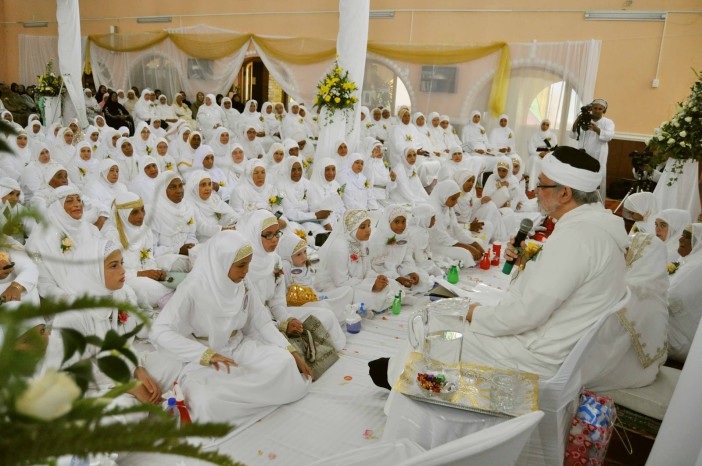By Yazeed Kamaldien
The scent of rose water and lemon oil fill the Heideveld mosque, where women gathered this month (JANUARY) for an annual tradition to mark the birth of Islam’s Prophet Muhammad.
This gathering is called Moulood an-Nabi and Muslims in various countries remember in different ways their prophet. Muhammad was reportedly born in Mecca, Saudi Arabia, in the year 571 on the 12th day of the Islamic month, Rabi ul-Awal.
At the Heideveld mosque and across Cape Town, women have gathered for hundreds of years to cut and scent lemon tree leaves, fold it in wrapping paper or small pieces of material, and gift it to men as part of the tradition known as ‘rampies sny’.

The word ‘rampies’ originates from the Malay word ‘rampai’. ‘Sny’ is the Afrikaans word for cut. This is indicative of the cross-cultural Cape heritage where language, race and cultures have intermingled.
Malaysians more specifically refer to ‘rampies sny’ as ‘bunga rampai’. The latter involves the fine slicing of flowers and leaves and mixing it together to create a fragrant potpourri.

While cutting the leaves, women recite Arabic praises for Prophet Muhammad and remember Allah, or God. After the leaves are cut, it is placed in a basket where it undergoes the ‘oeker’, which means that it is being prayed over, in Arabic, asking for God’s blessings.
This tradition stems from the Indonesian and Malaysian community that arrived in the Cape with Dutch colonisers from the mid-1600s. It is a cultural expression linked to Islam, and not a religious obligation or global practise.
Somaya Abdurahman, from Heideveld, said they use lemon tree leaves “because of the way it smells”. Scents enhance the fresh-smelling leaves.
Abdurahman remembers growing up in District Six, Cape Town, where families gathered for the annual event.
“During my childhood, we were excited to cut rampies. We dressed up in our best clothes. It brought our families and friends together,” said Abdurahman.
“We moved to Heideveld when I was ten years old. It’s still very exciting to get together for this. There are some people that we see only at this time of the year.”
Moulood an-Nabi is celebrated with ‘rampies sny’ across Cape Town throughout Rabi ul-Awal. It does not involve only ‘rampies sny’ though.

This celebration also sees men gathering at the mosque, after women have cut the rampies, to recite ‘riwaayat’, which is Arabic poetry honouring Prophet Muhammad. Women also gather in groups to recite ‘riwaayat’, although women and men do not gather at the same time.
Melodic tunes turn the poetry into songs that travelled to Cape Town across oceans centuries ago.
Communities have over the years formalised the tradition, with men and women creating teams that would recite the ‘riwaayat’ collectively. The teams would have tailors make unique dresses or suits for them for the days when they gather to recite ‘riwaayat’.
Abdurahman said it was “traditional that we all buy material and make dresses so that we all wear the same colour”.
She also said women would spend days “preparing the hall and baking cakes” for the get together of different teams who recite ‘riwaayat’.
Mymona Latief, who has for years been a religious teacher at the Heideveld mosque, said Moulood an-Nabi is an event that not all Muslims celebrate “because the prophet did not celebrate his birthday”.
“But cutting rampies brings people together,” she said.

Her late husband Ebrahiem Latief was the imam, or religious leader, at the mosque during the 1980s. She said he encouraged Moulood an-Nabi as it “gets the community together for a good purpose”.
“He was very into the community. He was doing a lot of things that brought the community together. Everything was done beautifully and collectively,” said Latief.
“This event makes the community feel very welcome at the mosque.”
[Source: yazkam.wordpress.com]





 WhatsApp us
WhatsApp us 


1 comment
Re: Moulood an-Nabi is an event that not all Muslims celebrate “because the prophet did not celebrate his birthday”.
There are mainly two types of Muslims in the world today – one lot tries to build things up; the other wants to break things down. The short-sighted Wahhabite Salafis who do not celebrate Moulood an-Nabi fall within the latter category.